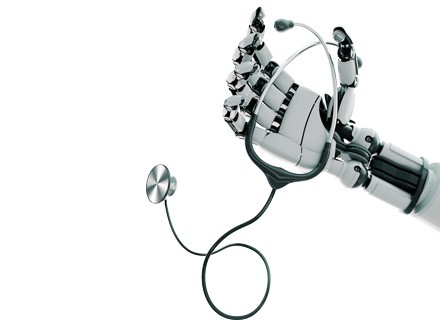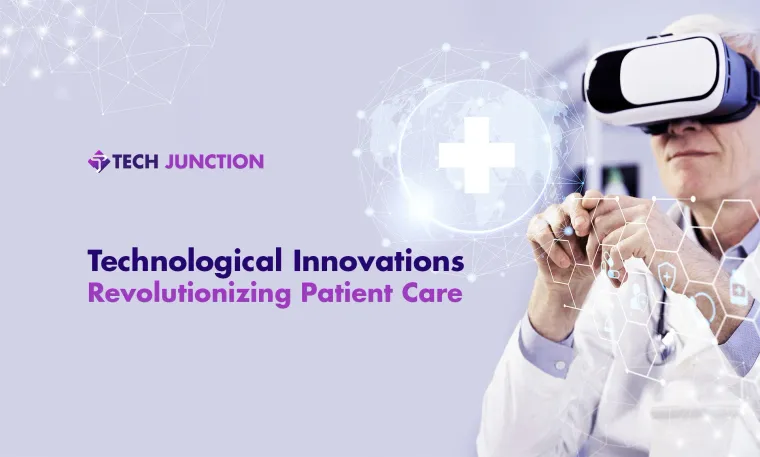The rapid evolution of healthcare has been profoundly influenced by technological advancements, heralding an era of unprecedented progress. These innovations in healthcare technology fundamentally transform how healthcare is accessed, delivered, and experienced.
Current Innovations in Healthcare Technology
From wearable health monitors to AI diagnostics, current innovations in healthcare technology have undergone a revolutionary transformation, significantly improving patient care through a multitude of innovations. Let's explore these game-changing advancements shaping modern healthcare.

Medical Wearables: Monitoring Health on the Go
Medical wearables are revolutionizing healthcare, offering convenient real-time monitoring of vital signs and health metrics. These devices, equipped with sensors and advanced technology, empower users to manage their wellbeing proactively. Hospitals recognize their value, utilizing wearables for enhanced patient care and remote monitoring.
An example is the collaboration between Stanford Medical Center and Apple, where Apple Watches monitored participants, transmitting data to an app. This innovation enables healthcare professionals to monitor heart health, facilitating timely interventions remotely. Medical wearables showcase the potential to revolutionize healthcare, offering personalized, proactive, and remote monitoring solutions that extend beyond traditional clinical settings, improving overall healthcare accessibility and outcomes.
Artificial Intelligence in Diagnostics
Artificial Intelligence (AI) is transforming healthcare diagnostics, enhancing accuracy in medical decision-making. Hospitals increasingly integrate AI-powered diagnostic systems to improve precision, minimize human errors, and expedite precise treatment plans.
An eminent example of AI implementation is the partnership between PathAI, a leader in AI-powered pathology technology, and Cleveland Clinic. PathAI employs machine learning algorithms to analyze digital pathology images, detecting nuanced patterns indicative of cancerous cells. This technology not only accelerates and enhances cancer diagnosis but also aids pathologists in identifying complex cases, reducing the likelihood of misdiagnosis. AI augments healthcare professionals' expertise, leading to superior accuracy and improved patient outcomes.
Electronic Health Records: Streamlining Patient Information
Electronic Health Records (EHR) have revolutionized the healthcare industry by streamlining patient information, improving accessibility, and enhancing care coordination. Hospitals worldwide are adopting EHR systems to provide a comprehensive and secure digital platform for storing and sharing patient records.
An excellent example of its implementation is the Mayo Clinic. With its robust EHR system, Mayo Clinic can seamlessly store and access patient information, including medical history, test results, medications, and treatment plans. This integration enables healthcare providers to make faster and more accurate diagnoses, ensure continuity of care, and enhance patient safety. The utilization of EHR by hospitals like Mayo Clinic demonstrates the significant transformative potential of technology in modernizing healthcare practices and delivering higher quality patient care.
Robotics and Surgical Assists: Precision in the Operating Room
In recent years, the integration of robotics and surgical assists has revolutionized the field of surgery by introducing a new level of precision and efficiency in the operating room. Robotic surgical systems, such as the da Vinci Surgical System used in Cleveland Clinic, Ohio, USA, have gained widespread popularity for enhancing surgical procedures across various specialties. These advanced systems provide surgeons with enhanced dexterity, precision, and control, allowing them to perform intricate procedures accurately. Robotic arms, which can replicate the surgeon's hand movements in a highly articulated manner, minimize the risk of human error and enable complex maneuvers in tight spaces. Additionally, incorporating computer-assisted technologies provides surgeons with real-time imaging, three-dimensional visualization, and magnification capabilities that enhance their perception of the surgical field.

3D Printing in Medicine: Personalized Solutions
3D printing has revolutionized the field of medicine by enabling the creation of personalized solutions tailored to individual patient needs. This advanced technology allows hospitals to fabricate intricate anatomical models, implants, and functional human organs.
An exemplary case is Auckland City Hospital in New Zealand, which utilizes 3D printing to enhance complex surgeries. By generating patient-specific models from medical imaging, surgeons simulate and optimize procedures, resulting in improved surgical outcomes and reduced operating time. Additionally, the hospital employs 3D printing to produce custom titanium implants for patients needing bone reconstruction. This innovative application underscores 3D printing's potential to revolutionize patient care, providing personalized solutions that enhance surgical precision, elevate patient outcomes, and accelerate the development of novel medical devices and implants.
Latest Innovations in Healthcare Technology
The future of healthcare is unfolding before our eyes, fueled by groundbreaking technologies. These latest healthcare technology innovations are poised to redefine how we approach medical care. From nanomedicine and genomics to AR-enhanced training, they promise a healthier, more connected tomorrow.
Nanomedicine: Targeted Drug Delivery
Nanomedicine employs nanotechnology to revolutionize healthcare, particularly in targeted drug delivery. This cutting-edge approach uses nanoscale materials to deliver drugs directly to specific cells or tissues, optimizing therapeutic efficacy while minimizing side effects.
Hospitals are actively integrating nanomedicine into their treatment protocols, and the Memorial Sloan Kettering Cancer Center in New York is a notable example. Here, nanocarriers deliver chemotherapy drugs precisely to cancer cells, reducing harm to healthy tissues and enhancing treatment effectiveness. Nanotechnology enables enhanced drug stability, controlled release rates, and precise targeting of tumors, showcasing its potential to improve patient outcomes significantly.
Internet of Medical Things: Connected Healthcare Devices
The Internet of Medical Things (IoMT) is revolutionizing healthcare, connecting medical devices and sensors to gather, transmit, and analyze real-time patient data. This interconnected network enhances patient monitoring, diagnostics, and treatment, delivering personalized and efficient healthcare.
Hospitals, including the prestigious Mayo Clinic in the United States, are leveraging IoMT. Mayo Clinic integrates IoMT-enabled smart medical devices and remote patient monitoring systems for telemedicine services. Patients utilize wearables to measure vital signs and share data with healthcare professionals instantly. This technology allows remote diagnosis, monitoring, and timely interventions and minimizes unnecessary hospital visits, exemplifying the potential of IoMT in modern healthcare.
Blockchain in Healthcare: Securing Patient Data
Blockchain technology is increasingly recognized for its potential to revolutionize the healthcare industry by securing patient data and enhancing data integrity. Blockchain is a distributed ledger system that enables secure, transparent, and tamper-resistant storage and sharing of information. In healthcare, it can facilitate the secure exchange of patient records, protect sensitive data, and streamline administrative processes.
Several hospitals have started integrating blockchain technology to improve data security and patient privacy. For instance, the Beth Israel Deaconess Medical Center (BIDMC) in Boston has collaborated with MIT Media Lab to explore using blockchain for securely sharing and accessing medical records. By leveraging blockchain's decentralized nature, BIDMC aims to enhance data interoperability, giving patients more control over their health data while maintaining privacy and security.
#Blockchain technology offers numerous benefits and applications in healthcare, revolutionizing how health data is managed, shared, and secured. Here are some ways in which blockchain technology can significantly benefit the healthcare industry: pic.twitter.com/YiI3T4VVkO
— Bondex (@bondexapp) October 30, 2023
Genomics and Precision Medicine
Genomics and precision medicine personalize healthcare by tailoring treatments to an individual's genetic makeup. Genomics involves studying a person's complete set of genes, while precision medicine uses this data for personalized healthcare. Understanding genetic variations and disease risks empowers healthcare providers to offer targeted therapies.
Mount Sinai Health System in New York City leads in integrating genomics and precision medicine. They analyze patient genomic data through their Genetic Testing Laboratory to guide treatment decisions and utilize the BioMe biobank, combining genomic and clinical data to devise personalized treatment plans. This showcases the potential of genomics and precision medicine in enhancing patient outcomes through tailored healthcare.
Drone Technology for Emergency Response
Drone technology is becoming increasingly vital in emergency response, revolutionizing hospitals' ability to deliver swift and effective healthcare. Drones can expedite medical supply delivery, transport crucial equipment, and even aid in organ transplantation logistics.
Wake Forest Baptist Medical Center in North Carolina, in collaboration with UPS, has pioneered a drone delivery network for efficient transportation of medical samples and supplies between hospitals and labs. This innovative approach significantly reduces response times, facilitating quicker diagnosis and treatment, especially in remote or inaccessible areas. Integrating drones in emergency response at institutions like Wake Forest Baptist Medical Center showcases how technology can transform healthcare delivery, making it more efficient and impactful.
Pro-Tip: You Can Check Our Tech Related Blogs Here
Embracing Future Innovations in Healthcare Technology: A Patient-Centric Approach
The healthcare industry is witnessing a profound transformation through cutting-edge innovations in healthcare technology, impacting diagnostics, personalized treatments, patient care, and data management. Adapting to these shifts is vital for healthcare providers and institutions to deliver optimal care in a dynamic landscape. By leveraging technology's potential, we anticipate a future where healthcare becomes exceedingly accessible, efficient, and centered around the needs of every patient.
The ongoing and upcoming latest innovations in healthcare technology, spanning from medical wearables and AI diagnostics to nanomedicine and genetic editing, are reshaping healthcare delivery. This evolution is propelling us towards a healthcare ecosystem that is not only technologically advanced but also deeply patient-oriented, promising a future where quality healthcare is within reach for all. By harnessing the potential of these advancements, we anticipate a future where healthcare becomes exceedingly accessible, efficient, and centered around the needs of every patient.
The Tech Junction is the ultimate hub for all things technology. Whether you're a tech enthusiast or simply curious about the ever-evolving world of technology, this is your go-to portal. If you want to write for us or have any feedback feel free to email us.





